高二人教新课标选修6 unit 4 课文翻译
高二人教新课标选修6 unit 4 课文翻译
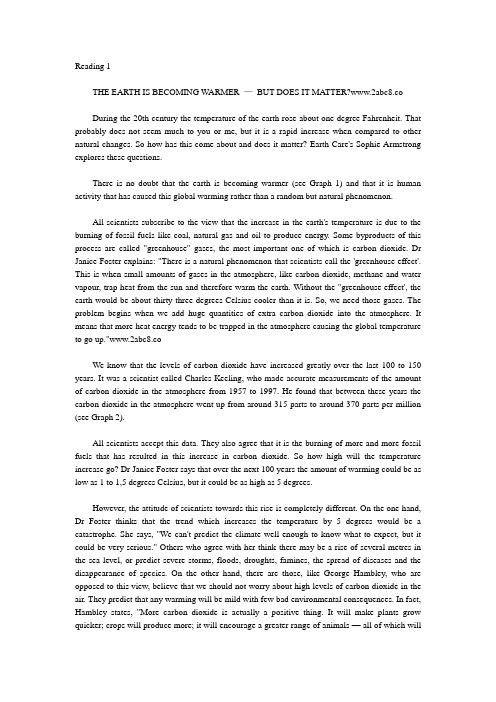
Reading 1THE EARTH IS BECOMING WARMER —BUT DOES IT MA TTER?www.2abc8.coDuring the 20th century the temperature of the earth rose about one degree Fahrenheit. That probably does not seem much to you or me, but it is a rapid increase when compared to other natural changes. So how has this come about and does it matter? Earth Care's Sophie Armstrong explores these questions.There is no doubt that the earth is becoming warmer (see Graph 1) and that it is human activity that has caused this global warming rather than a random but natural phenomenon.All scientists subscribe to the view that the increase in the earth's temperature is due to the burning of fossil fuels like coal, natural gas and oil to produce energy. Some byproducts of this process are called "greenhouse" gases, the most important one of which is carbon dioxide. Dr Janice Foster explains: "There is a natural phenomenon that scientists call the 'greenhouse effect'. This is when small amounts of gases in the atmosphere, like carbon dioxide, methane and water vapour, trap heat from the sun and therefore warm the earth. Without the "greenhouse effect', the earth would be about thirty-three degrees Celsius cooler than it is. So, we need those gases. The problem begins when we add huge quantities of extra carbon dioxide into the atmosphere. It means that more heat energy tends to be trapped in the atmosphere causing the global temperature to go up."www.2abc8.coWe know that the levels of carbon dioxide have increased greatly over the last 100 to 150 years. It was a scientist called Charles Keeling, who made accurate measurements of the amount of carbon dioxide in the atmosphere from 1957 to 1997. He found that between these years the carbon dioxide in the atmosphere went up from around 315 parts to around 370 parts per million (see Graph 2).All scientists accept this data. They also agree that it is the burning of more and more fossil fuels that has resulted in this increase in carbon dioxide. So how high will the temperature increase go? Dr Janice Foster says that over the next 100 years the amount of warming could be as low as 1 to 1,5 degrees Celsius, but it could be as high as 5 degrees.However, the attitude of scientists towards this rise is completely different. On the one hand, Dr Foster thinks that the trend which increases the temperature by 5 degrees would be a catastrophe. She says, "We can't predict the climate well enough to know what to expect, but it could be very serious." Others who agree with her think there may be a rise of several metres in the sea level, or predict severe storms, floods, droughts, famines, the spread of diseases and the disappearance of species. On the other hand, there are those, like George Hambley, who are opposed to this view, believe that we should not worry about high levels of carbon dioxide in the air. They predict that any warming will be mild with few bad environmental consequences. In fact, Hambley states, "More carbon dioxide is actually a positive thing. It will make plants grow quicker; crops will produce more; it will encourage a greater range of animals — all of which willmake life for human beings better."www.2abc8.coGreenhouse gases continue to build up in the atmosphere. Even if we start reducing the amount of carbon dioxide and other greenhouse gases, the climate is going to keep on warming for decades or centuries. No one knows the effects of global warming. Does that mean we should do nothing? Or, are the risks too great?第四单元全球在变暖www.2abc8.co全球在变暖一一这会带来什么影响吗?在20世纪期间,地球温度大约升了华氏1度。
(完整版)人教版英语选修6课文原文及课文译文

人教版英语选修6课文原文及课文译文Unit1 Art第一单元艺术ReadingA SHORT HISTORY OF WESTERN PAINTINGArt is influenced by the customs and faith of a people. Styles in Western art have changed many times. As there are so many different styles of Western art, it would be impossible to describe all of them in such a short text. Consequently, this text will describe only the most important ones. Starting from the sixth century AD.The Middle Ages(5th to the 15th century AD)During the Middle Ages, the main aim of painters was to represent religious themes. A conventional artistof this period was not interested in showing nature and people as they really were. A typical picture at this time was full of religious symbols, which created a feeling of respect and love for God. But it was evident that ideas were changing in the 13th century when painters like Giotto di Bondone began to paint religious scenes in a more realistic way.The Renaissance(15th to 16th century)During the Renaissance, new ideas and values gradually replaced those held in the Middle Ages. People began to concentrate less on religious themes and adopt a more humanistic attitude to life.At the same time painters returned to classical Roman and Greek ideas about art. They tried to paint people and nature as they really were. Rich people wanted to possess their own paintings, so they coule decorate their superb palaces and great houses. They paid famous artists to paint pictures of themselves, their houses and possessions as well as their activities and achievements.One of the most important discoveries during this period was how to draw things in perspective. This technique was first used by Masaccio in 1428. When people first saw his paintings, they were convinced that they were looking through a hole in a wall at a real scene. If the rules of perspective had not been discovered, no one would have been able to paint such realistic pictures. By coincidence,oil paints were also developed at this time, which made the colours used in paintings look richer and deeper. Without the new paints and the new technique, we would not be able to see the many great masterpieces for which this period is famous.Impressionism(late 19h to early 20th century)In the late 19th century, Europe changed a great deal,from a mostly agricultural society to a mostly industrial one. Many people moved from the countryside to the new cities. There were many new inventions and social changes also led to new painting styles. Among the painters who broke away from the traditional style of painting were the Impressionists, who lived and worke in Paris.The Impressionists were the first painters to work outdoors. They were eager to show how light and shadow fell on objects at different times of day. However, because natural light changes so quickly, the Impressionists had to paint quickly. Their paintings were not as detailed as those of earlier painters. At first, many people disliked this style of painting and became very angry about it. They said that the painters were careless and their paintings were ridiculous.Modern Art(29th century to today)At the time they were created, the Impressionist paintings were controversial, but today they are accepeted as the beginning of what we call "modern art". This is because the Impressionists encouraged artists to look at their environment in new ways. There are scores of modern art styles,but without the Impressionists, many of these painting styles might not exsist. On the one hand, some modern art is abstract; that is, the painter does not attempt to paint objects as we see them with our eyes, but instead concentrates n certain qualities of the object, using colour, line and shape to represent them. On the other hand, some paintings of modern art are so realistic that they look like photographs. These styles are so different. Who can predict what painting styles there will be in the future?西方绘画艺术简史西方艺术风格变化较大,而中国艺术风格变化较小。
人教版英语选修6课文原文及课文译文[精品文档]
![人教版英语选修6课文原文及课文译文[精品文档]](https://img.taocdn.com/s3/m/e40485b0680203d8cf2f2419.png)
人教版英语选修6课文原文及课文译文Unit 1 Art 第一单元艺术ReadingA SHORT HISTORY OF WESTERN PAINTINGArt is influenced by the customs and faith of a people. Styles in Western art have changed many times. As there are so many different styles of Western art, it would be impossible to describe all of them in such a short text. Consequently, this text will describe only the most important ones. Starting from the sixth century AD.The Middle Ages(5th to the 15th century AD)During the Middle Ages, the main aim of painters was to represent religious themes. A conventional artistof this period was not interested in showing nature and people as they really were. A typical picture at this time was full of religious symbols, which created a feeling of respect and love for God. But it was evident that ideas were changing in the 13th century when painters like Giotto di Bondone began to paint religious scenes in a more realistic way.The Renaissance(15th to 16th century)During the Renaissance, new ideas and values gradually replaced those held in the Middle Ages. People began to concentrate less on religious themes and adopt a more humanistic attitude to life.At the same time painters returned to classical Roman and Greek ideas about art. They tried to paint people and nature as they really were. Rich people wanted to possess their own paintings, so they coule decorate their superb palaces and great houses. They paid famous artists to paint pictures of themselves, their houses and possessions as well as their activities and achievements.One of the most important discoveries during this period was how to draw things in perspective. This technique was first used by Masaccio in 1428. When people first saw his paintings, they were convinced that they were looking through a hole in a wall at a real scene. If the rules of perspective had not been discovered, no one would have been able to paint such realistic pictures. By coincidence,oil paints were also developed at this time, which made the colours used in paintings look richer and deeper. Without the new paints and the new technique, we would not be able to see the many great masterpieces for which this period is famous.Impressionism(late 19h to early 20th century)In the late 19th century, Europe changed a great deal,from a mostly agricultural society to a mostly industrial one. Many people moved from the countryside to the new cities. There were many new inventions and social changes also led to new painting styles. Among the painters who broke away from the traditional style of painting were the Impressionists, who lived and worke in Paris.The Impressionists were the first painters to work outdoors. They were eager to show how light and shadow fell onobjects at different times of day. However, because natural light changes so quickly, the Impressionists had to paint quickly. Their paintings were not as detailed as those of earlier painters. At first, many people disliked this style of painting and became very angry about it. They said that the painters were careless and their paintings were ridiculous.Modern Art(29th century to today)At the time they were created, the Impressionist paintings were controversial, but today they are accepeted as the beginning of what we call "modern art". This is because the Impressionists encouraged artists to look at their environment in new ways. There are scores of modern art styles,but without the Impressionists, many of these painting styles might not exsist. On the one hand, some modern art is abstract; that is, the painter does not attempt to paint objects as we see them with our eyes, but instead concentrates n certain qualities of the object, using colour, line and shape to represent them. On the other hand, some paintings of modern art are so realistic that they look like photographs. These styles are so different. Who can predict what painting styles there will be in the future?西方绘画艺术简史西方艺术风格变化较大,而中国艺术风格变化较小。
完整word版,人教版英语选修6课文原文及课文译文
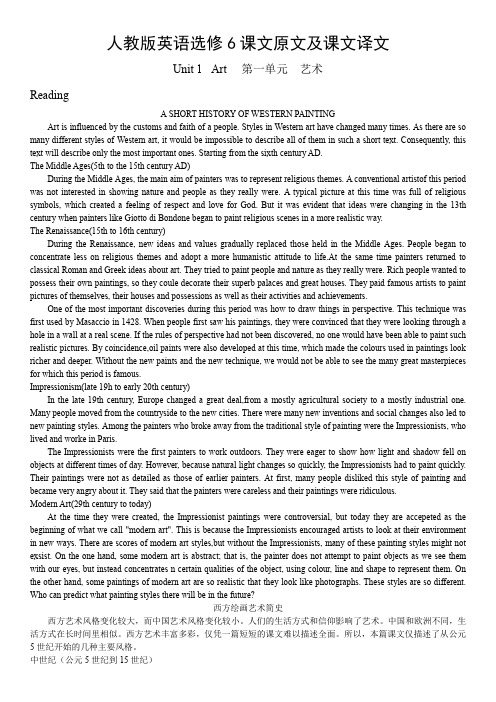
人教版英语选修6课文原文及课文译文Unit1 Art第一单元艺术ReadingA SHORT HISTORY OF WESTERN PAINTINGArt is influenced by the customs and faith of a people. Styles in Western art have changed many times. As there are so many different styles of Western art, it would be impossible to describe all of them in such a short text. Consequently, this text will describe only the most important ones. Starting from the sixth century AD.The Middle Ages(5th to the 15th century AD)During the Middle Ages, the main aim of painters was to represent religious themes. A conventional artistof this period was not interested in showing nature and people as they really were. A typical picture at this time was full of religious symbols, which created a feeling of respect and love for God. But it was evident that ideas were changing in the 13th century when painters like Giotto di Bondone began to paint religious scenes in a more realistic way.The Renaissance(15th to 16th century)During the Renaissance, new ideas and values gradually replaced those held in the Middle Ages. People began to concentrate less on religious themes and adopt a more humanistic attitude to life.At the same time painters returned to classical Roman and Greek ideas about art. They tried to paint people and nature as they really were. Rich people wanted to possess their own paintings, so they coule decorate their superb palaces and great houses. They paid famous artists to paint pictures of themselves, their houses and possessions as well as their activities and achievements.One of the most important discoveries during this period was how to draw things in perspective. This technique was first used by Masaccio in 1428. When people first saw his paintings, they were convinced that they were looking through a hole in a wall at a real scene. If the rules of perspective had not been discovered, no one would have been able to paint such realistic pictures. By coincidence,oil paints were also developed at this time, which made the colours used in paintings look richer and deeper. Without the new paints and the new technique, we would not be able to see the many great masterpieces for which this period is famous.Impressionism(late 19h to early 20th century)In the late 19th century, Europe changed a great deal,from a mostly agricultural society to a mostly industrial one. Many people moved from the countryside to the new cities. There were many new inventions and social changes also led to new painting styles. Among the painters who broke away from the traditional style of painting were the Impressionists, who lived and worke in Paris.The Impressionists were the first painters to work outdoors. They were eager to show how light and shadow fell on objects at different times of day. However, because natural light changes so quickly, the Impressionists had to paint quickly. Their paintings were not as detailed as those of earlier painters. At first, many people disliked this style of painting and became very angry about it. They said that the painters were careless and their paintings were ridiculous.Modern Art(29th century to today)At the time they were created, the Impressionist paintings were controversial, but today they are accepeted as the beginning of what we call "modern art". This is because the Impressionists encouraged artists to look at their environment in new ways. There are scores of modern art styles,but without the Impressionists, many of these painting styles might not exsist. On the one hand, some modern art is abstract; that is, the painter does not attempt to paint objects as we see them with our eyes, but instead concentrates n certain qualities of the object, using colour, line and shape to represent them. On the other hand, some paintings of modern art are so realistic that they look like photographs. These styles are so different. Who can predict what painting styles there will be in the future?西方绘画艺术简史西方艺术风格变化较大,而中国艺术风格变化较小。
人教版英语选修六第四单元课文翻译
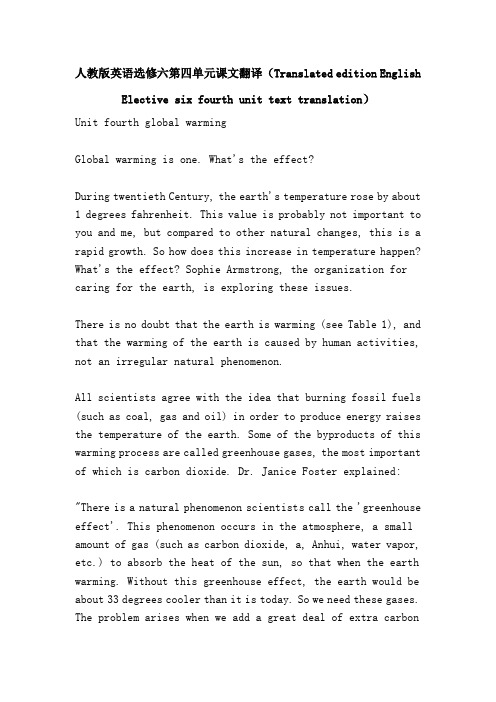
人教版英语选修六第四单元课文翻译(Translated edition English Elective six fourth unit text translation)Unit fourth global warmingGlobal warming is one. What's the effect?During twentieth Century, the earth's temperature rose by about 1 degrees fahrenheit. This value is probably not important to you and me, but compared to other natural changes, this is a rapid growth. So how does this increase in temperature happen? What's the effect? Sophie Armstrong, the organization for caring for the earth, is exploring these issues.There is no doubt that the earth is warming (see Table 1), and that the warming of the earth is caused by human activities, not an irregular natural phenomenon.All scientists agree with the idea that burning fossil fuels (such as coal, gas and oil) in order to produce energy raises the temperature of the earth. Some of the byproducts of this warming process are called greenhouse gases, the most important of which is carbon dioxide. Dr. Janice Foster explained:"There is a natural phenomenon scientists call the 'greenhouse effect'. This phenomenon occurs in the atmosphere, a small amount of gas (such as carbon dioxide, a, Anhui, water vapor, etc.) to absorb the heat of the sun, so that when the earth warming. Without this greenhouse effect, the earth would be about 33 degrees cooler than it is today. So we need these gases. The problem arises when we add a great deal of extra carbondioxide to the atmosphere. This means that more heat is trapped in the atmosphere, causing global temperatures to rise. "We know that carbon dioxide levels have increased dramatically over the past 100-150 years. A scientist named Charles Keeling once made accurate statistics on the amount of carbon dioxide in the atmosphere during the 1957-1997 years. He found that the amount of carbon dioxide in the atmosphere rose from 315/1000 000 to 370/1000 0000 over the years (see table two, slightly)All scientists accepted the data. They also agree that the increase in carbon dioxide is due to more and more burning of fossil fuels. "Then how high will the temperature rise?" Dr. Forster said, "in the next 100 years, the amount of global warming may be as low as 1-1.5 degrees Celsius, but it could be as high as 5 degrees Celsius."However, scientists are quite different in their attitudes towards warming. On the one hand, Dr Forster argues that the trend of warming 5 degrees could be a catastrophe. "We can't make accurate predictions about the future climate, but the weather may be bad at that time," she said. Other scientists agree with her view that global warming could cause sea levels to rise by several meters: others predicted severe storms, floods, droughts, famines, epidemics, and extinction of species. On the other hand, there are some people, like scientist George Hanbury, who oppose the above view. They don't think we need to worry about the high levels of carbon dioxide in the air. They predicted that the warming situation would not be too serious and the environmental impact would not be too bad. Hanbury actually said so:"The increase in carbon dioxide is actually a good thing. It makes plants grow faster, produce more crops and promote growth, all of which can improve human life.". "Greenhouse gases continue to collect in the atmosphere.". Even if we begin to reduce carbon dioxide and other greenhouse gases, the climate will continue to get warmer in the next few decades or centuries. No one knows what impact global warming will have. Does that mean we don't have to take any measures? Or, do not take any risks too great?Using languageWhat can we do about global warming?Dear Earth Care Organization: I am doing a research project on global warming on behalf of our school. Sometimes I feel that individuals can't do much about such a huge environmental problem. However, I still believe that people should support the improvement of daily energy consumption.Because I'm not sure where I should begin to begin my research.I hope to get your advice.Thanks, Ouyang GuangDear Ouyang Guang:There are a lot of people who take on your obligations, and they don't believe they have the power to influence the environment. The idea is incorrect. Every man sticks his wood, and his flameis high. We don't have to put up with pollution.The growth of greenhouse gases and carbon dioxide in the air is indeed derived from many of our daily activities. Here are some suggestions for reducing the carbon dioxide content in the air. These suggestions should contribute to your research.1. indoors, we use a lot of energy. You can leave it on when you use the appliance. Turn it off if you don't use it. Don't be careless about it. So, if you don't use the lights, the TV, the computer, turn them off. If you feel cold, put on more clothes rather than turn the heat on2. motor vehicles use a lot of energy. So, if possible, walk or ride a bike.3. recycle cans, bottles, plastic bags, and newspapers. It takes a lot of energy to do this with new materials, so buy the materials that are made of recycled materials whenever possible.4. advise your parents to buy energy saving products, including cars and small items such as refrigerators and microwave ovens.5. grow trees in your garden or campus. They can absorb carbon dioxide from the air and make you feel fresh when you watch them.6. finally, and most importantly, be an educator. Talk to your family and friends about global warming and tell them what you've learned.Remember, your contribution is valuable.。
高中英语选修6课文逐句翻译(人教新课标)

1.选修六Unit1 A SHORT HISTORY OF WESTERN PAINTING西方绘画艺术简史Art is influenced by the customs and faith of a people.艺术是受着人民生活习俗和信仰的影响的。
Styles in Western art have changed many times. 西方的艺术风格经历了多次变革。
As there are so many different styles of Western art, it would be impossible to describe all of themin such a short text.由于西方的艺术风格多种多样,在短短的一篇课文里不可能进行全面的描述。
Consequently, this text will describe only the most important ones, starting from the sixth century AD.因此 ,本文只谈及从公元6世纪以来最主要的几种艺术风格。
The Middle Ages (5th to the 15th century AD)中世纪(公元5世纪到15世纪)During the Middle Ages, the main aim of painters was to represent religious themes.在中世纪 ,画家的主要任务是把宗教的主题表现出来。
A conventional artist of this period was not interested in showing nature and people as they really were.一个传统的艺术家无意于如实地展现自然和人物。
A typical picture at this time was full of religious symbols, which created a feelingof respect and love for God. 那个时期的典型的绘画充满了宗教的(象 )特征 ,体现出了对上帝的爱戴与敬重。
[整理版]高中英语选修6 课文翻译
![[整理版]高中英语选修6 课文翻译](https://img.taocdn.com/s3/m/4842df82bb68a98270fefa42.png)
[整理版]高中英语选修6 课文翻译Module6 unit1艺术西方的艺术风格经历了多次变革,而中国艺术所经历的变革则比较少。
艺术受到人民生活方式和信仰的影响,而中国,和欧洲不同,它的生活方式在很长时期里都是相近的。
西方艺术风格多种多样,在短短的一篇课文里不可能进行全面的描述。
因此,本文只谈从公元5世纪以来少数几种主要的艺术风格。
中世纪(公元5世纪到15世纪)在中世纪,画家的主要任务是把宗教的主题表现出来。
艺术家们无意于如实地展现自然和人物,却着意体现对上帝的爱戴与敬重,因此,这段时期的绘画充满着宗教的信条。
到13世纪时,情况已经开始发生变化,像乔托这样的画家们开始以一种比较现实的风格来画宗教场景。
文艺复兴时期(15世纪到16世纪)在文艺复兴时期,新的思想和价值观取代了中世纪的思想和价值观。
人们开始更多地关注人而非宗教。
画家们回到了罗马、希腊的古典艺术理念上。
他们力争如实地画出人物和自然。
富人们想为自己的宫殿和豪宅收集艺术品,他们高价聘请著名艺术家来为自己画相,画自己的房屋和其它财物,以及他们的活动和成就。
在此期间,最重要的发现之一就是如何用透视法来画出事物。
第一个在绘画中使用透视法的人是马萨乔,那是在1428年。
当人们第一次看到他的画时,还以为是透过墙上的小洞来观看真实的场景,并对此深信不疑。
如果没有发现透视法,人们就不可能画出如此逼真的画。
在文艺复兴对期,油画也得到了发展,它使得色彩看上去更丰富、更深沉。
印象派时期(19世纪后期到20世纪初期)19世纪后期,欧洲发生了巨大的变化,从以农业为主的社会变成了以工业为主的社会。
许多人从农村迁入到新城市。
有着许多新发明,还有许多社会变革。
这些变革也自然而然地导致了绘画风格上的变化。
在那些突破传统画法的画家中有生活和工作在法国巴黎的印象派画家。
印象派画家是第一批室外写景的艺术家。
他们想把一天中不同时间投射到物体上的光线和阴影呈现出来。
由于自然光的变化很快,所以印象派画家们必须很快地作画,因此,他们的画就不像以前那些画家的画那样细致了。
新课标人教版选修六Book6 Unit4 Language points

所有科学家都赞同这样的观点:人们为了生产能量 而燃烧化石燃料(如煤、天然气、石油等),从而 引起了地球温度的升高。 同位语 句中that 引导___________ 从句。 因为,由于 (be)due to =because of ______________ 预定做…… be due to do sth _______________
句型:the+ adj.最高级+one of+which/who... 其中最……的…… 仿写: ⑴ 这里有很多的动画片,其中我最喜欢的是喜羊 羊与灰太狼。 the favorite one Here are many cartoons,_______________ _____________ is Happy Sheep And Gray of which Wolf. ⑵ 我有三个姐姐,其中最年轻的三年前去了美国。 I have three sisters, ____________________ youngest went to USA three the years ago. one of whom
Compare A to B 把A比作B Compare A B 把A与B相比 is often compared to Life_____________________voyage. 人生常被比作航海。 to/with If you________ compareBritish football _______American football,you’ll find many differences. 如果你把英式足球与美式足球相比,就会发现许多不 同之处。 Michael’s new house is like a huge palace,_________with his old one. A. comparing B. compares C. to compare D. compared
人教版英语选修6课文原文及课文译文
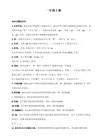
人教版英语选修6课文原文及课文译文Unit 1 Art 第一单元艺术ReadingA SHORT HISTORY OF WESTERN PAINTINGArt is influenced by the customs and faith of a people. Styles in Western art have changed many times. As there are so many different styles of Western art, it would be impossible to describe all of them in such a short text. Consequently, this text will describe only the most important ones. Starting from the sixth century AD.The Middle Ages(5th to the 15th century AD)During the Middle Ages, the main aim of painters was to represent religious themes. A conventional artistof this period was not interested in showing nature and people as they really were. A typical picture at this time was full of religious symbols, which created a feeling of respect and love for God. But it was evident that ideas were changing in the 13th century when painters like Giotto di Bondone began to paint religious scenes in a more realistic way.The Renaissance(15th to 16th century)During the Renaissance, new ideas and values gradually replaced those held in the Middle Ages. People began to concentrate less on religious themes and adopt a more humanistic attitude to life.At the same time painters returned to classical Roman and Greek ideas about art. They tried to paint people and nature as they really were. Rich people wanted to possess their own paintings, so they coule decorate their superb palaces and great houses. They paid famous artists to paint pictures of themselves, their houses and possessions as well as their activities and achievements.One of the most important discoveries during this period was how to draw things in perspective. This technique wasfirst used by Masaccio in 1428. When people first saw his paintings, they were convinced that they were looking through ahole in a wall at a real scene. If the rules of perspective had not been discovered, no one would have been able to paint such realistic pictures. By coincidence,oil paints were also developed at this time, which made the colours used in paintings look richer and deeper. Without the new paints and the new technique, we would not be able to see the many great masterpieces for which this period is famous.Impressionism(late 19h to early 20th century)In the late 19th century, Europe changed a great deal,from a mostly agricultural society to a mostly industrial one. Many people moved from the countryside to the new cities. There were many new inventions and social changes also led to new painting styles. Among the painters who broke away from the traditional style of painting were the Impressionists, who lived and worke in Paris.The Impressionists were the first painters to work outdoors. They were eager to show how light and shadow fell on objects at different times of day. However, because natural light changes so quickly, the Impressionists had to paint quickly. Their paintings were not as detailed as those of earlier painters. At first, many people disliked this style of painting and became very angry about it. They said that the painters were careless and their paintings were ridiculous.Modern Art(29th century to today)At the time they were created, the Impressionist paintings were controversial, but today they are accepeted as the beginning of what we call "modern art". This is because the Impressionists encouraged artists to look at their environmentin new ways. There are scores of modern art styles,but without the Impressionists, many of these painting styles might not exsist. On the one hand, some modern art is abstract; that is, the painter does not attempt to paint objects as we see them with our eyes, but instead concentrates n certain qualities of the object, using colour, line and shape to represent them. Onthe other hand, some paintings of modern art are so realistic that they look like photographs. These styles are so different. Who can predict what painting styles there will be in the future?西方绘画艺术简史西方艺术风格变化较大,而中国艺术风格变化较小。
选修六unit4课文原文和翻译课件

重点词汇和短语
01
02
03
04
05
引起了很多人的 关注
来自中国的一个 小城市
展示了他的一些 画作和木…
高超的技艺同而吸引了很多 人注意。
总结词
拓展阅读视野
详细描述
阅读延伸材料可以帮助学生拓展阅读视野, 了解更多的文化背景和语言知识。教师可以 推荐一些与课文主题相关的阅读材料,如同 一作者的其他作品、相关领域的期刊文章等。 学生可以通过阅读这些材料,加深对课文主 题的理解,同时提高自己的阅读能力和文化 素养。
研究性学习课题
要点一
总结词
归化与异化
归化翻译倾向于使目标语言读者更容易理解,而异化翻译则更注重 保留原文的文化和语言特色。
动态对等与形式对等
动态对等强调翻译过程中实现语义和文化的对等,而形式对等则更注 重在形式上保持原文的结构和表达方式。
翻译实例
英文原文
"The old man on the shore told me that the big waves came when the wind was strong."
培养研究能力
要点二
详细描述
研究性学习课题可以帮助学生深入探究课文主题,培养他 们的研究能力和独立思考能力。教师可以提出一些与课文 主题相关的问题,引导学生进行探究和思考,如作者的观 点是什么、文章的社会意义是什么等。学生可以通过收集 资料、整理分析数据、撰写研究报告等方式,对这些问题 进行深入研究,同时提高自己的研究能力和学术素养。
填空、选择等小测验
高二人教新课标选修6 unit 4 课文翻译

Reading 1THE EARTH IS BECOMING WARMER — BUT DOES IT MATTER During the 20th century the temperature of the earth rose about one degree Fahrenheit. That probably does not seem much to you or me, but it is a rapid increase when compared to other natural changes. So how has this come about and does it matter Earth Care's Sophie Armstrong explores these questions.There is no doubt that the earth is becoming warmer (see Graph 1) and that it is human activity that has caused this global warming rather than a random but natural phenomenon.All scientists subscribe to the view that the increase in the earth's temperature is due to the burning of fossil fuels like coal, natural gas and oil to produce energy. Some byproducts of this process are called "greenhouse" gases, the most important one of which is carbon dioxide. Dr Janice Foster explains: "There is a natural phenomenon that scientists call the 'greenhouse effect'. This is when small amounts of gases in the atmosphere, like carbon dioxide, methane and water vapour, trap heat from the sun and therefore warm the earth. Without the "greenhouse effect', the earth would be about thirty-three degrees Celsius cooler than it is. So, we need those gases. The problem begins when we add huge quantities of extra carbon dioxide into the atmosphere. It means that more heat energy tends to be trapped in the atmosphere causing the global temperature to go up." We know that the levels of carbon dioxide have increased greatly over the last 100 to 150 years. It was a scientist called Charles Keeling, who made accurate measurements of the amount of carbon dioxide in the atmosphere from 1957 to 1997. He found that between these years the carbon dioxide in the atmosphere went up from around 315 parts to around 370 parts per million (see Graph 2).All scientists accept this data. They also agree that it is the burning of more and more fossil fuels that has resulted in this increase in carbon dioxide. So how high will the temperature increase go Dr Janice Foster says that over the next 100 years the amount of warming could be as low as 1 to 1,5 degrees Celsius, but it could be as high as 5 degrees.However, the attitude of scientists towards this rise is completely different. On the one hand, Dr Foster thinks that the trend which increases the temperature by 5 degrees would be a catastrophe. She says, "We can't predict the climate well enough to know what to expect, but it could be very serious." Others who agree with her think there may be a rise of several metres in the sea level, or predict severe storms, floods, droughts, famines, the spread of diseases and the disappearance of species. On the other hand, there are those, like George Hambley, who are opposed to this view, believe that we should not worry about high levels of carbon dioxide in the air. They predict that any warming will be mild with few bad environmentalconsequences. In fact, Hambley states, "More carbon dioxide is actually a positive thing. It will make plants grow quicker; crops will produce more; it will encourage a greater range of animals —all of which will make life for human beings better." Greenhouse gases continue to build up in the atmosphere. Even if we start reducing the amount of carbon dioxide and other greenhouse gases, the climate is going to keep on warming for decades or centuries. No one knows the effects of global warming. Does that mean we should do nothing Or, are the risks too great第四单元全球在变暖全球在变暖一一这会带来什么影响吗在20世纪期间,地球温度大约升了华氏1度。
人教版高中英语选修6课文逐句翻译(2020年,Word版)
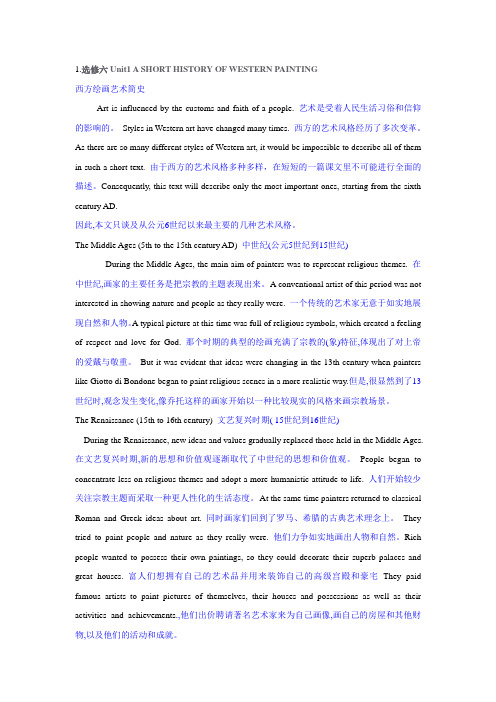
1.选修六Unit1 A SHORT HISTORY OF WESTERN PAINTING西方绘画艺术简史Art is influenced by the customs and faith of a people. 艺术是受着人民生活习俗和信仰的影响的。
Styles in Western art have changed many times. 西方的艺术风格经历了多次变革。
As there are so many different styles of Western art, it would be impossible to describe all of them in such a short text. 由于西方的艺术风格多种多样,在短短的一篇课文里不可能进行全面的描述。
Consequently, this text will describe only the most important ones, starting from the sixth century AD.因此,本文只谈及从公元6世纪以来最主要的几种艺术风格。
The Middle Ages (5th to the 15th century AD) 中世纪(公元5世纪到15世纪)During the Middle Ages, the main aim of painters was to represent religious themes. 在中世纪,画家的主要任务是把宗教的主题表现出来。
A conventional artist of this period was not interested in showing nature and people as they really were. 一个传统的艺术家无意于如实地展现自然和人物。
A typical picture at this time was full of religious symbols, which created a feeling of respect and love for God. 那个时期的典型的绘画充满了宗教的(象)特征,体现出了对上帝的爱戴与敬重。
人教版英语选修六课文翻译
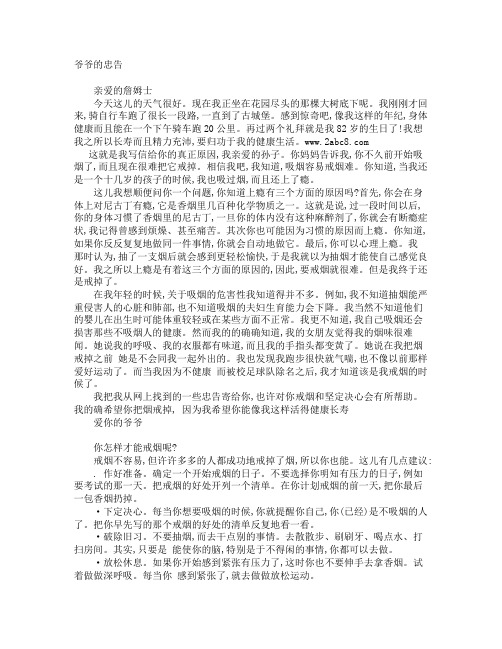
爷爷的忠告亲爱的詹姆士今天这儿的天气很好。
现在我正坐在花园尽头的那棵大树底下呢。
我刚刚才回来,骑自行车跑了很长一段路,一直到了古城堡。
感到惊奇吧,像我这样的年纪,身体健康而且能在一个下午骑车跑20公里。
再过两个礼拜就是我82岁的生日了!我想我之所以长寿而且精力充沛,要归功于我的健康生活。
这就是我写信给你的真正原因,我亲爱的孙子。
你妈妈告诉我,你不久前开始吸烟了,而且现在很难把它戒掉。
相信我吧,我知道,吸烟容易戒烟难。
你知道,当我还是一个十几岁的孩子的时候,我也吸过烟,而且还上了瘾。
这儿我想顺便问你一个问题,你知道上瘾有三个方面的原因吗?首先,你会在身体上对尼古丁有瘾,它是香烟里几百种化学物质之一。
这就是说,过一段时间以后,你的身体习惯了香烟里的尼古丁,一旦你的体内没有这种麻醉剂了,你就会有断瘾症状,我记得曾感到烦燥、甚至痛苦。
其次你也可能因为习惯的原因而上瘾。
你知道,如果你反反复复地做同一件事情,你就会自动地做它。
最后,你可以心理上瘾。
我那时认为,抽了一支烟后就会感到更轻松愉快,于是我就以为抽烟才能使自己感觉良好。
我之所以上瘾是有着这三个方面的原因的,因此,要戒烟就很难。
但是我终于还是戒掉了。
在我年轻的时候,关于吸烟的危害性我知道得并不多。
例如,我不知道抽烟能严重侵害人的心脏和肺部,也不知道吸烟的夫妇生育能力会下降。
我当然不知道他们的婴儿在出生时可能体重较轻或在某些方面不正常。
我更不知道,我自己吸烟还会损害那些不吸烟人的健康。
然而我的的确确知道,我的女朋友觉得我的烟味很难闻。
她说我的呼吸、我的衣服都有味道,而且我的手指头都变黄了。
她说在我把烟戒掉之前她是不会同我一起外出的。
我也发现我跑步很快就气喘,也不像以前那样爱好运动了。
而当我因为不健康而被校足球队除名之后,我才知道该是我戒烟的时候了。
我把我从网上找到的一些忠告寄给你,也许对你戒烟和坚定决心会有所帮助。
我的确希望你把烟戒掉, 因为我希望你能像我这样活得健康长寿爱你的爷爷你怎样才能戒烟呢?戒烟不容易,但许许多多的人都成功地戒掉了烟,所以你也能。
高中英语选修6课文逐句翻译(人教新课标)
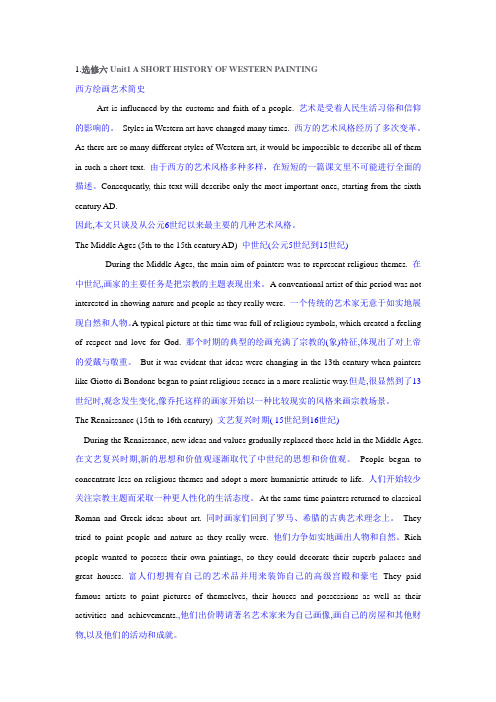
1.选修六Unit1 A SHORT HISTORY OF WESTERN PAINTING西方绘画艺术简史Art is influenced by the customs and faith of a people. 艺术是受着人民生活习俗和信仰的影响的。
Styles in Western art have changed many times. 西方的艺术风格经历了多次变革。
As there are so many different styles of Western art, it would be impossible to describe all of them in such a short text. 由于西方的艺术风格多种多样,在短短的一篇课文里不可能进行全面的描述。
Consequently, this text will describe only the most important ones, starting from the sixth century AD.因此,本文只谈及从公元6世纪以来最主要的几种艺术风格。
The Middle Ages (5th to the 15th century AD) 中世纪(公元5世纪到15世纪)During the Middle Ages, the main aim of painters was to represent religious themes. 在中世纪,画家的主要任务是把宗教的主题表现出来。
A conventional artist of this period was not interested in showing nature and people as they really were. 一个传统的艺术家无意于如实地展现自然和人物。
A typical picture at this time was full of religious symbols, which created a feeling of respect and love for God. 那个时期的典型的绘画充满了宗教的(象)特征,体现出了对上帝的爱戴与敬重。
人教版选修6英语课文翻译

人教版选修6英语课文翻译是说,画家并不打算把我们的眼睛看到的东西如实地画出来,而是集中体现某些物体的某些品质和特征,用色彩、线条和形状把它们呈现出来。
另一方面,有些现代派的艺术作品太逼真了,看上去就像一张照片。
预言将来艺术的风格倒是很有意思的。
曼哈顿艺术画廊荟萃弗里克收藏馆位于第五大道和麦迪逊大道之间许多艺术爱好者都认为这个收藏馆是纽约最好的一家小型艺术陈列馆。
亨利克莱·弗里克是纽约的一位富豪。
他去世于1919年,他把他的家具、房子和艺术收藏品都捐献给了美国人民。
在这个陈列馆里,你不仅看到20世纪以前的西方绘画的珍藏品,而且,你还能浏览弗里克的美丽的故居。
在这个漂亮的公寓里,花园也是很值得一看的。
古根海姆博物馆第5大道和第88街交汇处这家博物馆拥有5,000幅现代油画、雕塑和素描。
这些艺术品并不是同时展出的,展品总是在不断地更换。
所收藏的艺术品中大部分是印象派和后印象派的作品。
古根海姆博物馆的大楼是世界闻名的。
当你走进画廊的时候,你会觉得你进入了一个巨大的白色贝壳之中。
看画展最好是从顶层看起,一直往下看到底层。
展厅里没有楼梯,只有一条环行的小道。
博物馆里还有一家极好的餐馆。
(纽约)大都会艺术博物馆第5大道与第82街交汇处这家博物馆是美国收藏艺术品最多的一家,它的艺术品收藏涵盖了5,000多年来世界上众多国家的文明史,其中包括美洲、欧洲、中国、埃及、非洲和南美洲。
这家博物馆展出的不仅仅只是艺术,它还给你介绍了古代的生活方式。
你可以看到埃及的寺庙,明朝的御花园,18世纪法国豪宅中的住房,以及许多其他特殊展品。
现代艺术博物馆第53街(位于第5和第6大道之间)令人惊奇的是,在同一博物馆里竟能容纳下19世纪后期到21世纪的如此众多的名家巨作。
西方艺术的收藏包括有莫奈、凡·高、毕加索和马蒂斯等著名艺术家的作品。
有几句话需要提醒你注意:博物馆票价不菲,常常拥挤。
惠特尼美国艺术博物馆麦迪逊大道945号(靠近第75街)惠特尼博物馆藏有极好的当代美国画和雕塑品。
- 1、下载文档前请自行甄别文档内容的完整性,平台不提供额外的编辑、内容补充、找答案等附加服务。
- 2、"仅部分预览"的文档,不可在线预览部分如存在完整性等问题,可反馈申请退款(可完整预览的文档不适用该条件!)。
- 3、如文档侵犯您的权益,请联系客服反馈,我们会尽快为您处理(人工客服工作时间:9:00-18:30)。
Reading 1THE EARTH IS BECOMING WARMER —BUT DOES IT MA TTER?www.2abc8.coDuring the 20th century the temperature of the earth rose about one degree Fahrenheit. That probably does not seem much to you or me, but it is a rapid increase when compared to other natural changes. So how has this come about and does it matter? Earth Care's Sophie Armstrong explores these questions.There is no doubt that the earth is becoming warmer (see Graph 1) and that it is human activity that has caused this global warming rather than a random but natural phenomenon.All scientists subscribe to the view that the increase in the earth's temperature is due to the burning of fossil fuels like coal, natural gas and oil to produce energy. Some byproducts of this process are called "greenhouse" gases, the most important one of which is carbon dioxide. Dr Janice Foster explains: "There is a natural phenomenon that scientists call the 'greenhouse effect'. This is when small amounts of gases in the atmosphere, like carbon dioxide, methane and water vapour, trap heat from the sun and therefore warm the earth. Without the "greenhouse effect', the earth would be about thirty-three degrees Celsius cooler than it is. So, we need those gases. The problem begins when we add huge quantities of extra carbon dioxide into the atmosphere. It means that more heat energy tends to be trapped in the atmosphere causing the global temperature to go up."www.2abc8.coWe know that the levels of carbon dioxide have increased greatly over the last 100 to 150 years. It was a scientist called Charles Keeling, who made accurate measurements of the amount of carbon dioxide in the atmosphere from 1957 to 1997. He found that between these years the carbon dioxide in the atmosphere went up from around 315 parts to around 370 parts per million (see Graph 2).All scientists accept this data. They also agree that it is the burning of more and more fossil fuels that has resulted in this increase in carbon dioxide. So how high will the temperature increase go? Dr Janice Foster says that over the next 100 years the amount of warming could be as low as 1 to 1,5 degrees Celsius, but it could be as high as 5 degrees.However, the attitude of scientists towards this rise is completely different. On the one hand, Dr Foster thinks that the trend which increases the temperature by 5 degrees would be a catastrophe. She says, "We can't predict the climate well enough to know what to expect, but it could be very serious." Others who agree with her think there may be a rise of several metres in the sea level, or predict severe storms, floods, droughts, famines, the spread of diseases and the disappearance of species. On the other hand, there are those, like George Hambley, who are opposed to this view, believe that we should not worry about high levels of carbon dioxide in the air. They predict that any warming will be mild with few bad environmental consequences. In fact, Hambley states, "More carbon dioxide is actually a positive thing. It will make plants grow quicker; crops will produce more; it will encourage a greater range of animals — all of which willmake life for human beings better."www.2abc8.coGreenhouse gases continue to build up in the atmosphere. Even if we start reducing the amount of carbon dioxide and other greenhouse gases, the climate is going to keep on warming for decades or centuries. No one knows the effects of global warming. Does that mean we should do nothing? Or, are the risks too great?第四单元全球在变暖www.2abc8.co全球在变暖一一这会带来什么影响吗?在20世纪期间,地球温度大约升了华氏1度。
这个数值对你我来说很可能是无所谓的,但是跟其他自然变化相比较而言,这却是一种快速的增长。
那么,这种温度的增长是怎么产生的呢?会产生什么影响呢? “关爱地球”组织的索菲·阿姆斯特朗就在探究这些问题。
毫无疑问,地球是在变暖(见表一,略) ,而地球变暖正是人类活动导致而成的,并非是一种无规律的自然现象。
所有的科学家赞同这种观点:人们为了生产能量而燃烧化石燃料(如煤、天然气和石油等) ,从而引起了地球温度的升高。
这个升温过程的一些副产品就叫做"温室"气体,其中最重要的就是二氧化碳。
贾尼丝·福斯特博士解释说:www.2abc8.co"有一种科学家称之为‘温室效应'的自然现象。
这种现象发生在大气层中少量的气体(如二氧化碳、甲皖、水蒸汽等)吸收太阳的热量,因而使地球变暖的时候。
如果没有这种‘温室效应',地球的温度将比现在的温度还要低33摄氏度左右。
因此,我们需要这些气体。
当我们在大气层中增加了大量额外的二氧化碳时,问题就来了。
这意味着更多的热量被困在大气层中,从而引起全球温度上升。
"我们知道,在过去100-150年期间,二氧化碳的含量急剧增加了。
有一位名叫查尔斯·基林的科学家曾经把1957-1997年期间大气层中二氧化碳的含量作了精确的统计。
他发现,在这些年里,大气层中的二氧化碳含量从315/1000 000上升到370/1000 0000 (见表二,略)所有科学家都接受这个数据。
他们还赞同下述观点,正是由于越来越多燃烧化石燃料导致了二氧化碳的增加。
那么气温会升到多高?福斯特博士说,在今后的100年里,全球变暖的量可能低到1-1.5摄氏度, 但是也有可能高达5摄氏度。
www.2abc8.co然而,科学家们在对待升温的态度上却是大不相同的。
一方面,福斯特博士认为气温升高5度的趋势可能是一场大灾难,她说"对于未来的气候,我们不可能作出精确的预测,但是那时的天气可能是很糟糕的。
